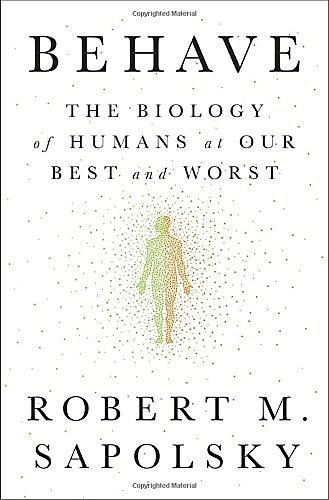Why do we do the things we do?
More than a decade in the making, this game-changing book is Robert Sapolsky’s genre-shattering attempt to answer that question as fully as perhaps only he could, looking at it from every angle. Sapolsky’s storytelling concept is delightful but it also has a powerful intrinsic logic: he starts by looking at the factors that bear on a person’s reaction in the precise moment a behavior occurs, and then hops back in time from there, in stages, ultimately ending up at the deep history of our species and its evolutionary legacy.
And so the first category of explanation is the neurobiological one. A behavior occurs–whether an example of humans at our best, worst, or somewhere in between. What went on in a person’s brain a second before the behavior happened? Then Sapolsky pulls out to a slightly larger field of vision, a little earlier in time: What sight, sound, or smell caused the nervous system to produce that behavior? And then, what hormones acted hours to days earlier to change how responsive that individual is to the stimuli that triggered the nervous system? By now he has increased our field of vision so that we are thinking about neurobiology and the sensory world of our environment and endocrinology in trying to explain what happened.
Sapolsky keeps going: How was that behavior influenced by structural changes in the nervous system over the preceding months, by that person’s adolescence, childhood, fetal life, and then back to his or her genetic makeup? Finally, he expands the view to encompass factors larger than one individual. How did culture shape that individual’s group, what ecological factors millennia old formed that culture? And on and on, back to evolutionary factors millions of years old.
The result is one of the most dazzling tours d’horizon of the science of human behavior ever attempted, a majestic synthesis that harvests cutting-edge research across a range of disciplines to provide a subtle and nuanced perspective on why we ultimately do the things we do…for good and for ill. Sapolsky builds on this understanding to wrestle with some of our deepest and thorniest questions relating to tribalism and xenophobia, hierarchy and competition, morality and free will, and war and peace. Wise, humane, often very funny, Behave is a towering achievement, powerfully humanizing, and downright heroic in its own right.
1、追日是作者栎年创作的原创作品,下载链接均为网友上传的的网盘链接!
2、相识电子书提供优质免费的txt、pdf等下载链接,所有电子书均为完整版!
-
暴走系乙女药的评论作者用科学解告诉我们:当你解释某个行为背后的动因时,要非常谨慎,不要轻易评判。而且要意识到,其中的每一个环节都有变化的可能。
-
Prunus d的评论虽然读起来并不轻松(超大部头),但是还是由衷为作者的努力感到敬佩,从各个层面解析了人类的行为来源(神经生物学、激素、记忆、发育、环境,等等等等),组织的角度也很新奇——立马展现的,需要时间的,母胎带来的,进化产生的。可以收着慢慢看!
-
rainbowrain的评论整合了很多有意思的方面,然而太冗长了。
-
Kennn.的评论听的有声书,专业词有点多信息量太大,可能要真的读才摄入得完全
-
晕过的评论实在读不完,属于动物行为学,脑神经学,生物学集大成者,告诉我们判断行为要考虑多方面,如脑硬件,文化等,人的行为是脑硬件基础下的产物,但硬件的变化原因多种多样。Rk
-
emma的评论信息量大,没有水分,非常值得看
-
JDK的评论开枪前一秒。 我们的行为是各种因素联合作用的果。
-
Nuo.V的评论生命科学几乎所有的发现都在提醒我们,生命和智慧其实都只是演化的旁观者和产品。我们身上的优势和弱点没有多少是我们能够决定的。所以面对生物学规律,我们必须保持谦卑。
-
凯蒂同学的评论涨了一点姿势 学了两个新词amygdala和frontal cortex以及它们都是干嘛的
-
QuietAmbassa的评论3.5. neuroscience 入门不错,后半部分有点无趣。犯了错误不应该听有声书,narrator虽然很不错,但插图/脚注/括号reference太多,影响体验。有几处做了笔记,以后应该会买一本再重读看看。
